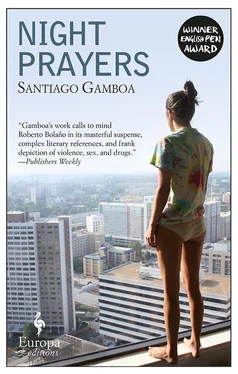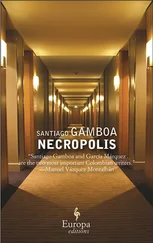“A Colombian girl?”
There was a silence and after a while the voice said: “That’s possible. Do you want her now?”
I calculated that I had a few hours free. “Yes,” I said.
“All right, sir, we’ll send her to your hotel right now, she’ll cost five hundred dollars.”
Five hundred dollars? I swallowed and said, looking at Juana’s photograph:
“All right, but she must have natural dark hair and dark eyes, be five and a half feet tall and thirty years old. I don’t want a teenager.”
“Don’t worry, sir, we’ll send someone with the characteristics you’re looking for. Will you be paying by credit card?”
“No. In cash.”
I poured myself a drink and lay down on the bed, feeling nervous. Would it be her? It was absurd to think it would, but whoever came might know her or know something about her, it wasn’t unlikely that the Colombian women here were in contact. I’d seen that in other countries. Economic migrants meet together, organize, support each other. Were there organizations of Latin American women in Japan? There had to be. It could be another lead.
Knock, knock.
My heart skipped a beat. I got up and opened the door.
It was room service, with more ice, so I continued with my deliberations. I tried to think of other possible points of contact. All at once a light came on in my head: a church with a Colombian or Latin American priest who held masses in Spanish. That was the place! Knowing her history, it was most likely that Juana was an atheist, but there might be someone in that church who knew her, or who knew where else in Tokyo you could look for a Colombian girl.
Knock, knock.
This time there was no room for doubt, and I opened the door.
It was a woman of about thirty, with dark skin and dark eyes. About five and a half feet tall. I asked her what her name was and she said, I’m Cindy. Are you Colombian? Yes, she said, from Cartago. From her northwestern accent I realized she wasn’t Juana, but physically speaking, even though she was a bit different than the photograph, she could have been her.
She didn’t react when I told her we were compatriots, only asked me to pay her and then walked to one side, with her cell phone in her hand.
“I’m sorry, I have to call my mamiya and confirm, it won’t take a moment.”
Mamiya ? That must be her protector. Then she sat down on the bed and told me that for that price I was entitled to a blowjob and complete “frontal sex.” Anything else would be extra, which struck me as fair. I asked her how long and she said, thirty minutes, forty maximum. I said that to start with we could talk for a while, that I preferred to use the time asking her a few things.
“You aren’t going to ask me difficult questions, are you?”
“No,” I said, “only easy ones. Do you know a Colombian girl named Juana Manrique? She lives here in Tokyo.”
She looked up at the ceiling and shook her head. I explained to her that she was from Bogotá and I showed her the photograph, fully aware that in a situation like this, even if she knew her, even if she was her best friend, she’d be most likely to say no… out of fear, or because she didn’t know who I was, or didn’t know the reason for my interest.
Cindy looked at the photograph and said she looked like a number of Colombian women she had known, but she wasn’t sure, and the name didn’t ring any bells. She had been in Japan for six years and had seen lots of girls come and go. I offered her a drink and she accepted; by the second sip, she seemed more trusting, so I told her who I was and why I was looking for Juana.
“I’m a consul,” I said, “and I’d like to help her. She doesn’t know it, but she’s involved in a problem I’d like to help solve.”
My explanation convinced her and she started to lower her guard. Juana did sound vaguely familiar, but she really wasn’t sure, all the same she’d think about it. I asked her if she was happy with her life and she said she was lucky; it had been hard at first, but now it was better and she could send money to her mother, who was bringing up her son in Cartago. She began by working on the street, like the others, never knowing who the guy was who was taking her to the hotel on the corner, or sometimes into his car; she’d feel scared, or disgusted, or even amused at the things Japanese men asked her to do: spit in their mouths, urinate on their faces, hit them with the heel of her shoe.
“These people are so regimented that the only time they let themselves go and enjoy life is when they have sex,” she said, “but they aren’t violent, I’ll say that for them. The thing is, the language sounds very abrupt and you always think they’re telling you off, but deep down they’re affectionate, they help you, they have feelings, they even give tips.”
In the two years she was on the street, her knees frozen with cold from lowering and raising her stockings so much (that’s how she put it), nothing untoward ever happened to her.
I asked her if there was a group of Colombian friends and she said, yes, but not an official one, just a bunch of Latin American girls who got together in a Latino restaurant called La Caverna, in the Shinjuku district.
Then I gave her my telephone number and e-mail address. She promised to call me if she found out anything. As I poured her a third drink, she got a call on her cell phone and she stiffened again.
“It’s my mamiya ,” she said.
She spoke with her hand over the phone. When she hung up she said, I have to go, but if you want me again I can arrange it. I walked her to the door and said: I can’t now, but I’ll be here until Sunday and I’d love to see you again. She smiled and walked down the corridor to the elevators.
I opened my notebook and wrote: La Caverna, Shinjuku district.
That night we had a presentation at the Cervantes Institute. We talked about literature, our careers, and our relationship with the work of Gabriel García Márquez, which is an obligatory question. As I listened to either Juan Gabriel or Enrique talking, I can’t remember which, I looked out at the audience and, suddenly, I was almost certain that Juana was in the hall. A sociology student from the National University wouldn’t miss an event like this. My heart started pounding and I began looking along each row. The lights in the hall had been dimmed, and there were two spotlights shining directly at the platform, blinding me. But I did the best I could, starting from the front rows and moving back.
It’s a well-known fact that audiences for this kind of event, and for literature in general, are made up mostly of women — there are authors with a great practical sense who aim their writings at them — which is why that night, at the Cervantes Institute in Tokyo, there were at least three possible Juanas in every row.
But as I was scrutinizing the upper part of the hall, where it was darkest, I spotted a woman sitting alone in the left-hand corner. She had taken a seat some distance from the others, as if afraid to be recognized. Her age was right for Juana, so I looked straight at her, seeking out her eyes, trying to establish a modicum of contact, but at that very moment I heard the voice of the presenter saying my name and I realized it was my turn, so I started talking. I spoke a little about everything, about my life and the things I’d read and what it might mean to be a writer in this strange era, to be a Latin American writer and as if that weren’t enough a Colombian, if that still made any sense at all, if it meant something in aesthetic terms or was only an avatar that bound us to a series of landscapes, problems and complexes, to a common frame of mind and a fairly grim history, a fast-paced reality and a way of speaking, and all this transplanted to literature, where, for many, to be a Colombian seemed to oblige us to deal with certain themes and above all to deal with those themes in a particular way, which was why my generation and the ones after us were trying to escape all that, trying to be just writers, and I added that in our part of the world, being a writer was a highly uncertain and probably unhappy existence because of the helpless state, the neglect and poverty in which most of our writers grew old and died, or because of the fact that, once you reached a certain level of recognition, that became an excuse to ridicule you on the part of those who hadn’t made it or had made it some time ago and had seen their own success devalued by newcomers, not to mention the critics, most of whom were writers or frustrated writers, although as my friend Jorge Volpi says, “a literary critic isn’t a frustrated writer. A literary critic is a frustrated literary critic.”
Читать дальше












